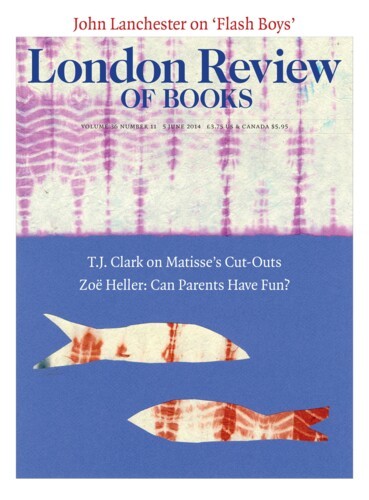How should a biographer describe the subject’s birth? A simple way is to note the time and place, the state of the family and any complications. In Eleanor Marx: A Life (Bloomsbury, £25), Rachel Holmes tries for something more vivid; ‘was born’ won’t do. She uses the present tense, and an active verb: ‘Eleanor Marx tumbles prematurely into the world in London at the moment before dawn on Tuesday 16 January 1855.’ Where is her father? ‘Puffing anxiously on a cigar in the corner of the overcrowded room at 28 Dean Street is Europe’s greatest political scientist. Karl and Jenny Marx have another child.’ Holmes is fond of the one-line paragraph:
They’d hoped for a boy. It’s a girl.
Holmes likes to do scene-setting – audio, visual, olfactory. Inside, Jenny Marx is given a dose of laudanum for the pain:
Sweetened with honey, liquorice and anise, the laudanum adds spice and caramel scents to the overheated atmosphere. The reassuring aroma of strong German coffee mingles with the tang of blood, camphor, tobacco smoke and coal dust. Elegant and solidly expensive, the Kaffeekanne, a wedding gift from Jenny’s mother, looks out of place amongst cracked crockery, shabby, cramped surroundings and dilapidated furniture.
Outside is Soho where, Holmes emphasises, there’s vice:
Boots of working Londoners, horseshoes and cartwheels crunch through the fresh morning snow. Superbly drunk revellers weave amongst them three sheets to the wind, tacking vaguely homewards or on to the next tavern, bawling heartily and insensible to the cold and their frost-nipped noses. Glum prostitutes sheltering in the portal to Miss Kelly’s Royalty Theatre diagonally opposite 28 Dean Street eye up the soakers and calculate their possible worth.
The adverbs and adjectives accumulate. But how to connect the infant subject to the themes of her life? ‘Teeny as she is, the Marxes’ newborn baby daughter declares her arrival with hearty, indignant yelling, joining her first protest at the shock of existence with the street-life dawn chorus of Soho beneath the second-floor window.’ We are all born protesters.
After the natal scene, the present tense is abandoned, but not the overwriting or the sentimentalising. The book is on a nickname basis with its principals. Jenny Marx is referred to as Möhme, Karl as Mohr, Eleanor as Tussy: ‘T-oo-ssy to rhyme, as her parents explained, with pussy and not fussy. Her parents’ explanation of the correct pronunciation turned out to be prescient: fussy Tussy was not, but kittens and cats she adored from infancy.’ As the child grew, she showed her talents: ‘She played with words as easily as she played with her kittens, puppies, dolls and stamp collection.’
Relating the Marx family history, Holmes tries to sound modern. Of Jenny’s suitor Lieutenant Karl von Pannewitz, she writes: ‘The effect of the young officer’s elegant uniform wore off as fast as the Wachau Valley champagne hangover when Jenny discovered his conversation to be dull, politics neo-conservative and sense of humour banal.’ Perhaps von Pannewitz was an early supporter of the invasion of Iraq. Holmes’s adverbs have funny effects: ‘In 1841, on an unchaperoned visit to him in Bonn, Jenny cheerfully lost her virginity to Karl.’ It’s good to know she wasn’t as glum as the Soho prostitutes.
I won’t give away Holmes’s rendering of the scene at Eleanor’s deathbed (‘The scent of bitter almonds lingered around her corpse’). Kathryn Hughes in the Guardian says that Holmes’s support for the theory that Eleanor was murdered by her caddish partner Edward Aveling ‘is as much metaphorical as literal’, and criticises her for diminishing Eleanor’s previous suicide attempt and other tensions within the Marx family. But she has kind words for Holmes’s ‘ebullient prose’. Jeanette Winterson calls the book ‘brilliant’ in the Telegraph; Rosemary Ashton in the Literary Review points up its ‘brio’; Lisa Jardine in the Financial Times says Holmes’s ‘fresh and vital style’ renders Eleanor ‘unforgettable’. None of them quotes the book at length; as usual with biographies, it’s the subject that’s under review. But why did Holmes and her editors think it best to deliver her ample research in such a purple package? It must be something to do with capitalism.
Send Letters To:
The Editor
London Review of Books,
28 Little Russell Street
London, WC1A 2HN
letters@lrb.co.uk
Please include name, address, and a telephone number.

